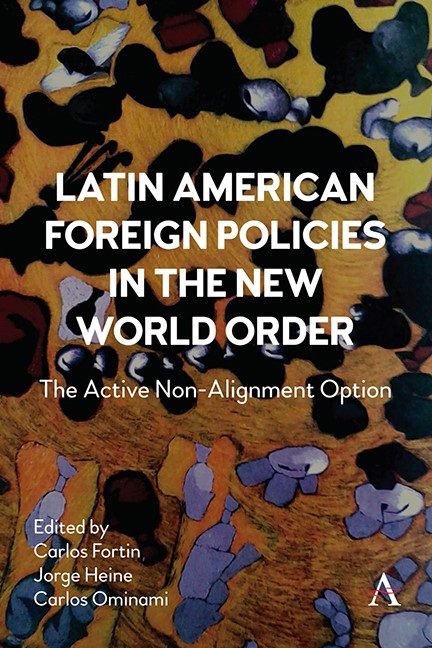Book contents
- Frontmatter
- Dedication
- Contents
- List of Tables and Figures
- Foreword
- Introduction: Active Non-Alignment (ANA) A Doctrine
- Part One The Emerging World Order
- Part Two Active Non-Alignment In The New Geopolitical Environment
- Part Three Active Non-Alignment in the New International Political Economy
- Part Four National Perspectives
- Conclusions—Implications of an Active Non-Alignment (ANA)
- Notes on Contributors
- Index
Chapter Nine - Latin America in The Post-Western World
Published online by Cambridge University Press: 15 November 2023
- Frontmatter
- Dedication
- Contents
- List of Tables and Figures
- Foreword
- Introduction: Active Non-Alignment (ANA) A Doctrine
- Part One The Emerging World Order
- Part Two Active Non-Alignment In The New Geopolitical Environment
- Part Three Active Non-Alignment in the New International Political Economy
- Part Four National Perspectives
- Conclusions—Implications of an Active Non-Alignment (ANA)
- Notes on Contributors
- Index
Summary
This chapter begins by laying out the key elements of the Post-Western World, one shaped by an increasingly Asia-centric global order, great power competition that directly impacts globalization, and a highly uneven recovery from the COVID-19 pandemic. In the second part, it points to three advantages Latin America enjoys in this context: relatively high economic compatibility with Asia; geopolitical and diplomatic versatility that allows it to articulate a strategy that involves neither automatic alignment with China nor the United States; and a guaranteed seat at the table in the global debate about climate change, arguably one of the key issues that will influence the global order going forward. Third, it proceeds to analyze the key obstacles that Latin America faces in such a new global environment, ranging from a lack of regional coordination to a “Western-centric” mindset among political and economic elites—which leaves the region unprepared to adapt to the shift of power toward Asia—to enormous domestic challenges which reduce the time and attention political decision-makers can dedicate to global issues. Finally, this chapter points to three specific recommendations of how Latin America can react to the momentous political shifts and the arrival of the Post-Western World and great power politics. That involves, above all, mechanisms to avoid “importing” the dawning ideological struggle between Washington and Beijing into domestic politics of Latin American countries. Second, the new geopolitical context calls for the development of a broader debate in Latin America about how to strengthen regionalism in the face of returning great power politics and ways to balance constructive ties with both the United States and China (Fortin, Heine and Ominami 2020), which is what Active Non-Alignment (ANA), the subject of this book, is all about. Third, there is an urgent need for initiatives that help policy makers, civil society, and businesses adapt to a more Asia-centric world, a region numerous decision-makers across the continent are not familiar with.
The Post-Western World: Three Trends
The arrival of the Post-Western World is often associated with a historic shift of economic power away from the West and toward Asia, but it would be a mistake to limit its impact to the economic realm.
- Type
- Chapter
- Information
- Latin American Foreign Policies in the New World OrderThe Active Non-Alignment Option, pp. 123 - 132Publisher: Anthem PressPrint publication year: 2023



